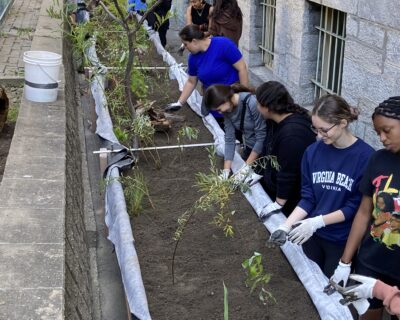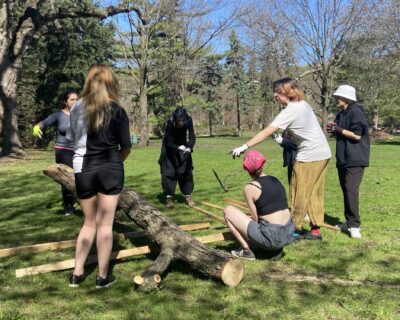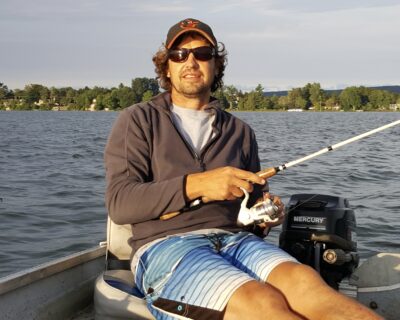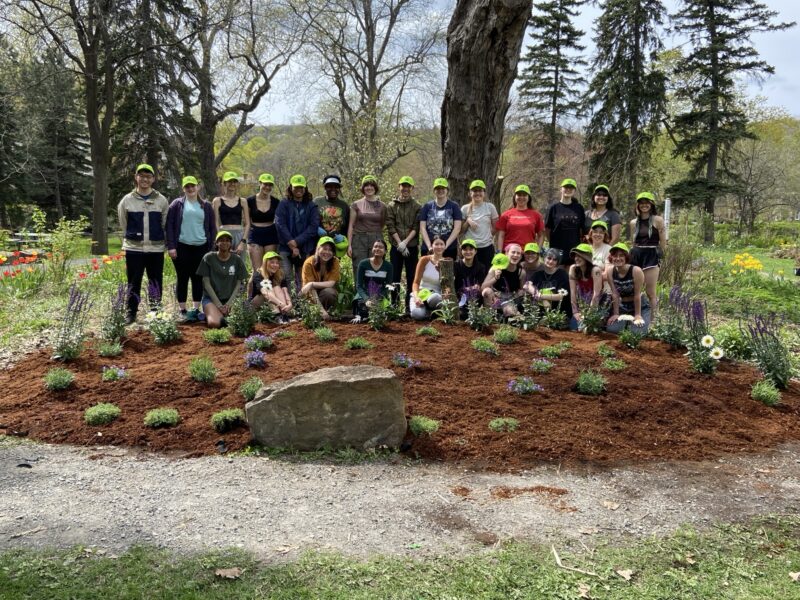200 teachers a semester!
It might sound like a cliché, but CEGEP students truly do want to make the world a better place, says Paul Wasacz, a teacher of Physical Education at Dawson College.
“They want to make a difference and wish to be taken seriously,” he said. “They have opinions and thoughts, and they want to be heard. They are industrious and creative and able to find solutions. If you give them ownership and a say, they run with it.”
This is what happens in his Eco-Landscaping course, a popular course he launched in 2022 with support from Richard Montreuil in Physical Education and Chris Adam in the Office of Sustainability. The course was initially proposed by former colleague Anthony Berkers. “I was the lucky one who got to teach it,” he said. Previous classes have created the Dawson wetlands, overhauled sections of the Peace Garden, set up a Hugel garden (German for hill or mound), and helped make the First Peoples’ Centre Garden.
Paul is gearing up for the sixth project: new pollinator wildflower gardens, part of the landscape plan for the campus. His class will be working through the weekend of May 3-4.
“What are we going to do?”
Every time he begins, he gives his students the goal and the resources and turns it over to them. “What are we going to do?” he asks them. The wetlands project was the first class and first project. Many of the students were just beginning at Dawson. Together, they created a habitat that filters and cleans rainwater from the roof, which is still functioning on the west side of the building near the parking lot. The students had a great first experience at Dawson, got to know fellow students at a quieter time just before the semester began and were able to admire the fruit of their work during their time at Dawson, he said.

Students working on the Dawson wetlands project in 2022.
The topic of individuals making differences comes up in every class. “Inevitably there’s some cynicism and pessimism as there should be. It’s the drop in a bucket kind of analogy where if we’re all one drop, it takes a long time for things to happen, but the bucket is inevitably becoming filled. When we’re all putting drops in the bucket, that bucket gets filled a lot faster, and we’re all making waves, and we’re all making ripples.
“What we’re doing here could be felt by many species and could be impacting many, many things. Doing things locally is doing things globally and we are having an impact.
“We’re planting milkweed for the monarch butterflies. We’re giving them spaces to land when they’re migrating from Mexico. We’re giving them places where they can feel safe.
We’re giving them a spot where they feel adequate for them to lay their eggs and to rest. That’s a huge impact and that’s not just on the little block of Dawson!”
Saving the whales
The students are encouraged to be making a difference and do see how their individual decisions and actions can lead to good things. Paul recalled something Chris Adam told him about saving the whales. “Everyone wants to save the whales,” he said. “What we did at Dawson is saving the whales. We are turning the water back with 50 per cent less pollutants. That’s saving the whales!”
Two years ago, in the aftermath of a major ice storm, there were many broken limbs all over the campus and they only had a few days to get their garden project done. Paul’s students were undaunted. “They were moving big limbs around and working really hard. Sometimes, you just have to get out of their way!”

Students figuring out how to clear big limbs for gardening in 2023.
Before Dawson, Paul taught at Riverview Elementary School in Verdun and LaSalle Community Comprehensive High School in LaSalle. He really loves the CEGEP cohort: “The students’ willingness to learn, their maturity and responsibility…they are really inspiring!”
Leap of faith
Paul enjoys teaching this age group. Before he made the “leap of faith” to come to Dawson in 2018, he accompanied Dawson students on a ski trip and had a great conversation with a young man who was had decided to transfer into Civil Engineering. Paul enjoyed speaking to this thoughtful and smart student. “I’m sitting next to the student going ‘Holy Moses’. He’s so bright and he’s so mature and he’s so kind. And that was the student that made me think, well, I can do this! He made me think it would be really good to work with students like him if he’s the typical student. Honestly, he does typify a lot of the students that I speak to.”
That conversation solidified his decision to move to the CEGEP level and leave his work family at LCCHS. “Some of these students are incredible,” he said. “It’s nice to meet them at the beginning of their journey and see where they end up.”
Paul keeps his motivation up with the awareness that he is trying to give his best for his students and give them assignments that are applicable in real life and make them think. Paul, who went to Verdun Catholic High School (now Beurling Academy), said: “My teachers gave everything to us. I have to pay it forward.”
Admiration for his students
People tell him how fortunate he is to get to make an impact on students and share his knowledge. He says they get it wrong: “I have 200 teachers a semester!” He admires his students and says that for half of his students: “I could not walk a mile in their shoes.”
“They tell me how to be better every semester,” he said. “They share experiences that help me grow as an educator.” This humility and openness have shaped him into the empathetic teacher he is today. He keeps up his mental and physical health by regular exercise, especially running, playing hockey and hiking. An avid fisher, he also enjoys time exploring with his wife and three sons.
Paul pursued degrees in English literature and history at Concordia University before finding his calling in Physical Education at McGill University.
Coming from a family of educators, including his father, grandmother, and brothers, Paul grew up surrounded by the values of education and the fulfillment it brings. “I saw my father love going to work and love being home,” Paul recalled. “He modeled a nice career for me.”
His career is a testament to the power of relationships, resilience, and purpose-driven teaching. His ability to connect with students on a personal level has left an indelible mark on countless lives. As he reflects on his journey, Paul remains deeply grateful for the privilege of being an educator: “It’s an honour,” he said. “I’m blessed to leave my fingerprints on my students’ lives—and they leave theirs on mine.”

Paul in his happy place, fishing.
Photos: all provided by Paul Wasacz



